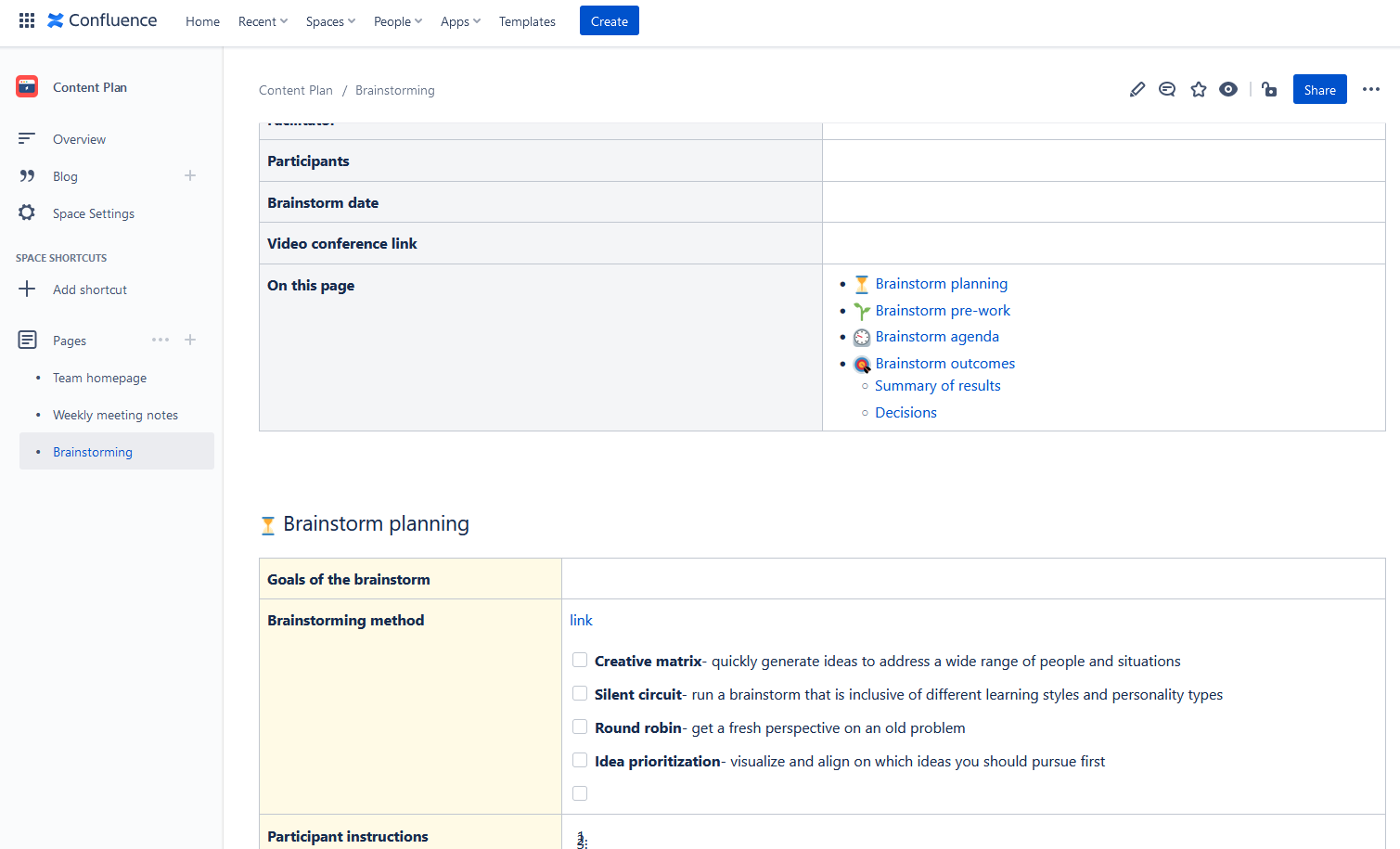
Are you tired of the knowledge bottleneck in your company? Is information siloed and hard to access?
If you're looking for a solution, you may be considering a corporate wiki or knowledge base. At first glance, these two tools may seem similar, but they're actually quite different. In this post, we'll explore the benefits and drawbacks of each option and help you determine which one is right for your business.
What is a Corporate Wiki
A corporate wiki, also known as an enterprise wiki, company wiki, or internal wiki is a collaborative authoring system that allows a community of internal company users (such as employees) to add, edit, and maintain content related to a given topic. If you're familiar with Wikipedia, then you essentially understand how corporate wikis work - the only difference is that Wikipedia is an example of a wiki that's open to the public while a corporate wiki is limited in use to a company's internal stakeholders.
 Example of a corporate wiki that can be used by content marketing teams
Example of a corporate wiki that can be used by content marketing teams
The content of a corporate wiki can be created and edited by any internal user as long as they have access to a web browser. This type of content authoring system differs from a company blog in that corporate wikis have no inherent structure and content is created without a defined content leader.
The aim of an internal wiki is to crowdsource content from a group of internal users and the key is for these users to act “collaboratively”. Doing so allows employees to share knowledge in an effort to enhance a company's overall explicit knowledge and tacit knowledge.
Why Companies Use a Corporate Wiki
Company wikis offer several benefits to companies looking to improve internal communication and knowledge sharing.
Here are some of the pros of using a wiki internally:
1. Improve Collaboration
An internal wiki should boost employee engagement in a number of ways. Most crucially, it’s by getting your team to collaborate more and improve their ability to share and transfer knowledge. Collaboration is crucial for any teams who need to share information and documents, which also constantly need to be updated.
2. Retain More Knowledge
Knowledge retention is also a key differentiator for businesses keen to outperform their competitors. Every time an employee leaves for any reason, companies lose knowledge. Knowledge loss can even result in accidents that cost millions of dollars.
3. Reduce Employee Attrition
A wiki can help reduce staff attrition by improving access to knowledge your company already has. Companies can leverage the resources of the crowd to produce a comprehensive knowledge repository that grows organically.
Potential Drawbacks of Using a Corporate Wiki
While there are clearly a few benefits to companies making use of a corporate wiki, there are also quite a few drawbacks. In fact, some of the benefits of a wiki can serve as a double-edged sword.
This brings us to our first hurdle concerning wikis. It’s obvious that your employees will be more engaged with your content if it follows a logical structure. They can learn the system and be confident they know what your knowledge base contains.
Structuring your content is fantastic when you appreciate how boosting employee engagement can increase profits by $2400 per employee a year. The ability to structure properly is just one way that knowledge bases are superior to wikis.
In fact, there are many disadvantages to using a corporate wiki, which is why you’ll find they are slowly dying out in for companies looking to invest in knowledge management.
Some of the potential problems with a corporate wiki include:
1. Limited Structure
One of the main disadvantages of a corporate wiki is that it can lack structure. Without any hierarchy of authorship or content review, information can quickly become disorganized and difficult to navigate. This can lead to confusion and frustration for employees trying to find the information they need.
2. Limited Search
Imagine this: You need to find a specific piece of information on your company's internal wiki, but you have no idea where to start looking. You type a few keywords into the search bar, hit enter, and are immediately hit with a barrage of irrelevant results. After sifting through page after page of useless information, you're left feeling frustrated and unproductive. Sound familiar?
Unfortunately, this scenario is all too common with corporate wikis. Unlike knowledge bases, which are designed to have a clear information hierarchy, wikis often lack a well-organized system for tagging and categorizing content. As a result, it can be difficult to locate the information you need when you need it.
In fact, according to a survey by McKinsey & Company, employees spend an average of 1.8 hours per day searching for information. That's almost 10 hours per week wasted on unproductive search activities!
Poor search functionality in wikis not only wastes time, but it can also lead to errors and misunderstandings. For example, let's say two different departments are working on similar projects, but they don't know that the other is already working on it. This lack of communication could lead to duplicated efforts, wasted resources, and potentially costly mistakes.
3. Poor Quality Control
Let's picture another scenario. This time, you’re a new employee and you’re tasked with finding a solution to a complex customer issue. You turn to your company’s internal wiki for guidance, but unfortunately, the information you find is inaccurate and outdated. Frustrating, right?
This is yet another major downside of a corporate wiki: poor quality control. When every employee has the same permission level to add information, there’s no way to ensure that the information being shared is accurate or up-to-date. This means that a customer service representative could potentially add information that is completely wrong, leading to miscommunication and potentially even lost business.
4. Minimal Analytics
A corporate wiki generally offers limited analytics - this means in many cases, you won’t be able to see any content gaps within your wiki or who your top users are, for example. This makes it difficult to get a full picture of the impact of any content being created or viewed. In turn, this makes it challenging to plan future content as well as how to improve your current wiki content.
Without access to robust analytics, it's challenging to identify what's working and what's not in your wiki. You can't see what content is most popular or least used, which makes it difficult to determine where to focus your efforts. You also can't track user behavior, such as what content they access, how long they stay on a page, or what actions they take after reading a piece of content.
5. Limited Customization
A wiki can have limited options for customization, which can make it difficult to create a user-friendly interface. This can lead to a lack of engagement with the wiki, as employees may find it difficult or confusing to use.
What is a Knowledge Base
Like a wiki, knowledge base software is also designed to curate important information. And just like a corporate wiki, knowledge base software is limited in use to people within the company. The main difference though is that your knowledge base content is centrally produced by a team of dedicated writers. While any employee is meant to be a contributor to a corporate wiki, only a select few internal stakeholders are given permission to create content for a knowledge base that's meant to be used internally.
You can think of a knowledge base as hierarchical, with a clear distinction between authors and readers.
 Example of a knowledge base being used internally to create blog content
Example of a knowledge base being used internally to create blog content
A knowledge base is typically created and maintained by a dedicated team of writers who follow a content strategy and produce content according to a schedule. The information is structured and organized using Information Architecture, which ensures that the content is easily searchable and accessible.
Benefits of a Knowledge Base
A knowledge base provides significant benefits in comparison with the drawbacks of corporate wikis:
1. Content Quality Control
One of the biggest advantages of a knowledge base over a corporate wiki is the ability to maintain content quality control. As mentioned earlier, a corporate wiki allows anyone to contribute information, which can result in poor quality control, inaccuracies, and inconsistencies.
In contrast, a knowledge base is centrally produced by a team of dedicated writers who follow a content strategy and schedule. This approach ensures that the content is written in a consistent style, adheres to the company's brand and voice, and is factually accurate. The writers are typically subject matter experts who are well-versed in the topics they are writing about.
Furthermore, a knowledge base often has an approval process for publishing new content, which ensures that the information provided is reviewed by experts within the company before it is made available to the wider audience. This helps to prevent incorrect or out-of-date information from being published, which could harm the company's reputation or lead to costly mistakes.
2. Better Organization
With a knowledge base, content is produced and curated by a dedicated team of writers, who follow a content strategy and a clear information architecture. This allows for a consistent structure and format across all articles, making it easier for users to find the information they need.
Additionally, knowledge base software often includes features such as tagging, categorization, and search functionality, which make it even easier to find the right information. Users can search for specific topics or browse through different categories to locate the content they need. This level of organization not only saves time, but it can also improve the accuracy and reliability of the information presented.
3. Robust Analytics
A knowledge base offers insights into how people are interacting with your organizational knowledge. You can see what users are searching for and contributing, the impact of the knowledge being shared, how the knowledge is being used, and more. This ensures that you can identify where there is missing information and make sure to fill any content gaps.
4. Strong Search
Since the content is centrally produced and organized, it can be tagged with relevant keywords and metadata, making it easier to find through search. This is especially helpful for larger organizations with a vast amount of information, as employees can quickly find the information they need without having to sift through pages of irrelevant content.
Additionally, many knowledge base solutions offer advanced search features like Boolean operators, machine learning, AI, and faceted search, which further enhance the search experience and help employees find the most relevant information quickly and easily.
With strong search functionality, employees can spend less time searching for information and more time applying it to their work, ultimately increasing their productivity and efficiency.
Drawbacks of a Knowledge Base
Despite the many strengths of a knowledge base over a corporate wiki, there are still some drawbacks that you need to address when creating your knowledge base:
1. Requires Initial Content Investment
While a corporate wiki grows organically by crowdsourcing organizational knowledge to create articles, a knowledge base builds its advanced capabilities on top of a structured foundation. You need to start with a core set of essential documents and grow from there.
2. Need Subject Matter Experts
A knowledge base requires subject matter experts who are committed to updating content regularly to create and publish content to maintain high-quality organizational knowledge sharing.
Finding the Right Knowledge Management Solution
Businesses typically make use of wiki software or knowledge base software as part of their knowledge management efforts.
Knowledge management enables you to improve a variety of company processes, such as:
Onboarding Employees
A positive onboarding experience can be the difference between success and failure for a new hire; 69% of employees are more likely to stay with a company for three years if they experienced great onboarding, and organizations with a standard onboarding process experience 50% greater new-hire productivity. Early access to organizational knowledge helps new hires clarify their confusions or misunderstandings, find solutions to common issues or problems, and identify best practices and optimal workflows for specific processes. Additionally, familiarity with the knowledge management system will ensure they contribute to the organizational knowledge when the time comes.
Daily Employee Productivity
Good knowledge management means workers have the information necessary to answer key company questions and do their job effectively and efficiently. Furthermore, large businesses in the U.S. lose approximately $47 million in productivity each year as a direct result of inefficient knowledge sharing, with workers wasting 5.3 hours per week either waiting for vital information or recreating existing knowledge.
Customer Service
72% of customers prefer to use the internet to find answers to their questions on their own rather than using a phone or email to contact a customer service agent. When customers can’t find the information they are looking for, they are likely to search for answers elsewhere. Effective knowledge management makes it easy for consumers to get the information they need, so they are more inclined to use your product instead of an alternative. If, and when, a customer does need to contact a customer service agent via phone or email, knowledge management makes it easy for customer service agents to provide the best possible consumer experience.
It seems obvious that knowledge management is key to increasing the success of your company and that wiki or knowledge base software should be at the center of your knowledge management strategy.
So now the question is, “What is the most effective way to manage your organizational knowledge?”
Corporate Wiki vs Knowledge Base
Wiki tumbleweed is a real problem, as your staff find your content increasingly impenetrable and fail to use it. What represented a novel way to engage your staff now becomes an embarrassing waste of money.
Limited options to customize your site means your wiki will look like something from the Windows 95 era. It won’t be like the sophisticated knowledge portal you were hoping for. This is very bad, since users come to expect
Unlike a wiki, a SaaS knowledge base offers a customizable front-facing website that is UX-optimized and visually appealing. It doesn’t require users to be technical specialists to publish content. The modern CMS is perfectly geared towards editing and publishing posts. With a wiki, you can’t really customize the front end without fairly advanced coding skills.
SaaS knowledge bases – like our own Helpjuice – are hosted for you, so you don’t have to worry about managing the software in the back-end. You can benefit from 24/7 customer support to troubleshoot any problems. Your internal knowledge base integrates with your IT ticketing system, so you can easily turn emails into help articles that save time.
You can also track the search queries on your knowledge base, showing you the popularity of pages to indicate which topics your employees are looking for.
A wiki can seem appealing because it requires less initial content investment than a knowledge base. The idea is that your employees organically contribute to the wiki, which builds itself. In reality, wikis are difficult to manage without significant content oversight. Wikis notoriously have the potential to rapidly sprawl into an unusable mess.
Instead of crowdsourcing your content, the key is to work together with Subject Matter Experts to source your knowledge. Employees are motivated to share their knowledge in order to empower and help others.
Once they see your knowledge base is a valuable resource, they will be motivated to contribute – and highly engaged teams are 21% more profitable.
“Knowledge is like money: to be of value it must circulate, and in circulating it can increase in quantity and, hopefully, in value,” said American novelist Louis L’Amour, Education of a Wandering Man.
Take it Away!
Whether you choose a wiki or a knowledge base for your team, it’s essential that your company has a formal method of knowledge sharing. This is the route to providing a strong foundation for employee engagement.
Employee engagement starts from the ground up. Neither a wiki nor an internal knowledge base will fix deep-rooted cultural problems. But a healthy workplace culture can be enhanced with appropriate knowledge-sharing processes.
“To win in the marketplace you must first win in the workplace,” says Doug Conant, CEO of Campbell’s Soup. This means treating your employees like customers by providing them with the necessary knowledge to do their jobs effectively.
Helpjuice' s knowledge base software can help you win in the workplace. It’s a platform you can use to easily produce your own internal knowledge base. Try it for yourself right now.
![Internal Wiki Guide: How to Create One + Best Software to Use [2023]](https://s3.amazonaws.com/helpjuice-static/helpjuice_production%2Fuploads%2Fupload%2Fimage%2F4752%2Fdirect%2F1609788064037-Internal+Wiki.jpg)
![SharePoint Alternatives: 15 Best Competitors to Consider [2024]](https://static.helpjuice.com/helpjuice_production/uploads/upload/image/4752/direct/1576238567499-1573601605688-Sharepoint%20Alternatives.png)


